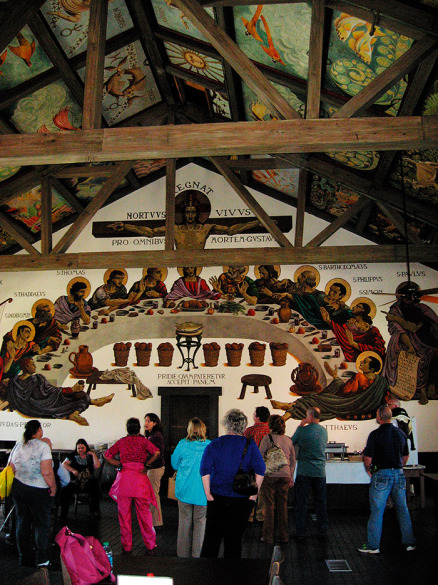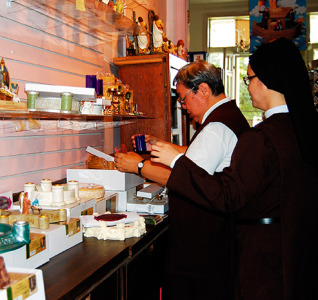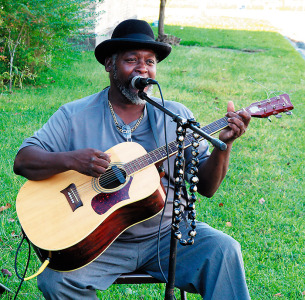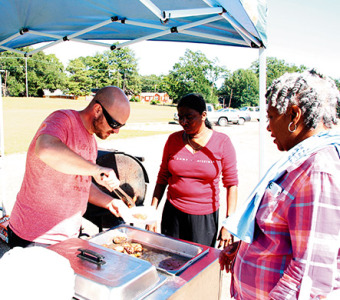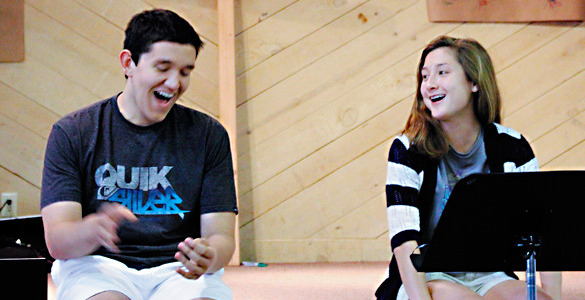VATICAN CITY (CNS) – No saint was ever known for having a “funeral face,” Pope Francis said; the joy of knowing one is loved by God and saved by Christ must be seen at least in a sense of peace, if not a smile.
Celebrating the third Sunday of Advent, Gaudete Sunday, Dec. 14, Pope Francis paid an evening visit to Rome’s St. Joseph Parish, meeting with the sick, with a group of Gypsies, with a first Communion class and with dozens of couples whose newborn babies were baptized in the past year.
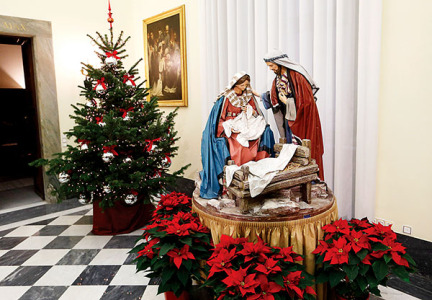
A Nativity scene and Christmas tree decorate the Apostolic Palace at the Vatican Dec. 15. (CNS photo/Paul Haring)
“Be joyful as you prepare for Christmas,” he told them at Mass, urging as a first step that people thank God each day for the blessings they have been given.
A Christian’s Christmas joy has nothing to do with “the consumerism that leads to everyone being anxious Dec. 24 because, ‘Oh, I don’t have this, I need that’ — no, that is not God’s joy.”
With Christmas “less than 15 days away, no 13 days, let us pray. Don’t forget, we pray for Christmas joy. We give thanks to God for the many things he has given us and for faith, first of all.”
Earlier in the day, reciting the Angelus with visitors in St. Peter’s Square, Pope Francis blessed the statues of the Baby Jesus that will take center place in Nativity scenes in Rome schools, churches and homes.
Addressing the children who brought their figurines to the square, the pope said, “When you pray in front of your creche at home, remember to pray for me, like I will remember you.”
At the end of the Angelus, volunteers distributed a little booklet, marked “gift of Pope Francis,” containing the texts of the Our Father and Hail Mary and other “traditional prayers,” as well as prayers drawn from the Psalms and the “five-finger prayer.”
Using the fingers on one hand, the prayer guides people in praying for those closest to them, for those who teach, for those who govern, for those who are weak and – on the pinkie or smallest finger – for one’s own humility.
“The human heart desires joy,” the pope said in his Angelus address. “We all want joy; every family, all peoples aspire to joy. But what kind of joy are Christians called to witness? It is that joy that comes from closeness to God and from his presence in our lives.”
“A Christian is one who has a heart full of peace because he or she knows how to find joy in the Lord even when going through difficult moments in life,” he said. “Having faith does not mean not having difficulties, but having the strength to face them knowing that we are not alone.”
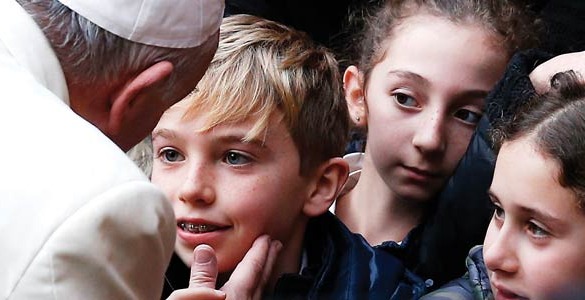
Pope Francis greets a boy as he arrives to celebrate Mass at St. Joseph Parish in Rome Dec. 14. (CNS photo/Paul Haring)
When joy or at least peace shines through a person’s face, he said, others will wonder why, opening the possibility of sharing with them the Gospel.
With Christmas approaching, the pope said, “the church invites us to give witness that Jesus is not just a historical figure; he is the word of God who continues to illuminate people’s paths today; his gestures – the sacraments — show the tenderness, consolation of love of the Father for every human being.”
Dressed in rose vestments for the evening Mass at the parish on Rome’s western edge, Pope Francis explained that usually Advent vestments are a dark color, “but today they are rose because the joy of Christmas is blossoming.”
“The joy of Christmas is a special joy, a joy that is not only for Christmas Day, but for the entire life of a Christian,” he said.
Speaking without a prepared text, the pope said someone could say, “’Oh, father, we make a big meal (at Christmas) and everyone is happy.’ This is beautiful. A big meal is good, but it is not the Christian joy we’re talking about.”
Christian joy, he said, “comes from prayer and from giving thanks to God.” It grows as one reviews all the blessings God has given.
“But there are people who do not know how to thank God; they always look for things to complain about,” the pope said. Speaking confidentially, he told parishioners that he used to know a nun who worked hard, “but her life was all about complaining,” so much so that “in the convent they called her ‘Sister Whiner.’ But a Christian can’t live that way, always looking for something to complain about!”
(Copyright © 2014 Catholic News Service/United States Conference of Catholic Bishops. The CNS news services may not be published, broadcast, rewritten or otherwise distributed, including but not limited to, such means as framing or any other digital copying or distribution method in whole or in part, without prior written authority of Catholic News Service.)
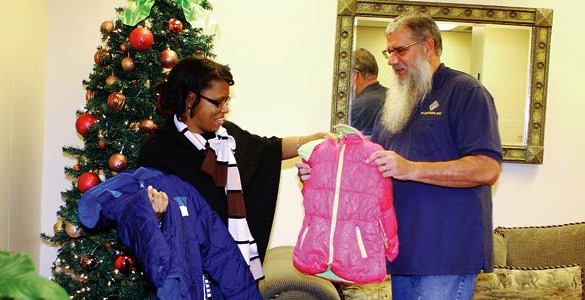



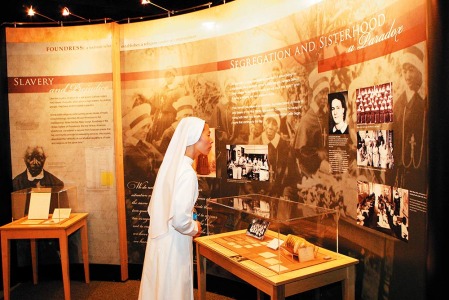
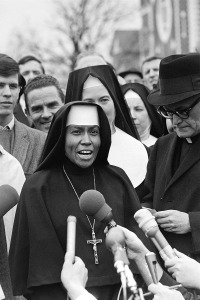






 MADISON – Two St. Joseph Catholic School juniors were elected to the top two leadership spots at the Mississippi Youth and Government 2014 Youth Legislature held Nov. 19-21. Benjamin Payne ran unopposed for governor, while Noah Greene won a two-person race for lieutenant governor. This is the first time that St. Joe students have won and will serve in the top two Youth Legislature leadership positions at the same time.
MADISON – Two St. Joseph Catholic School juniors were elected to the top two leadership spots at the Mississippi Youth and Government 2014 Youth Legislature held Nov. 19-21. Benjamin Payne ran unopposed for governor, while Noah Greene won a two-person race for lieutenant governor. This is the first time that St. Joe students have won and will serve in the top two Youth Legislature leadership positions at the same time.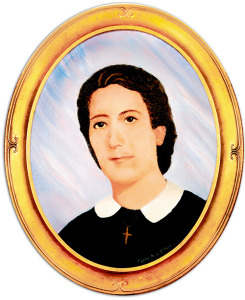 unveiled a portrait of their founder. The nine-by-four-foot painting by artist Ulrick Jean-Pierre was commissioned by late congregational leader, Sister Eva Regina Martin, SHF, and hangs in the motherhouse. It shows Sister Delille surrounded by the poor she served for her whole life with St. Augustine church in the background.
unveiled a portrait of their founder. The nine-by-four-foot painting by artist Ulrick Jean-Pierre was commissioned by late congregational leader, Sister Eva Regina Martin, SHF, and hangs in the motherhouse. It shows Sister Delille surrounded by the poor she served for her whole life with St. Augustine church in the background.